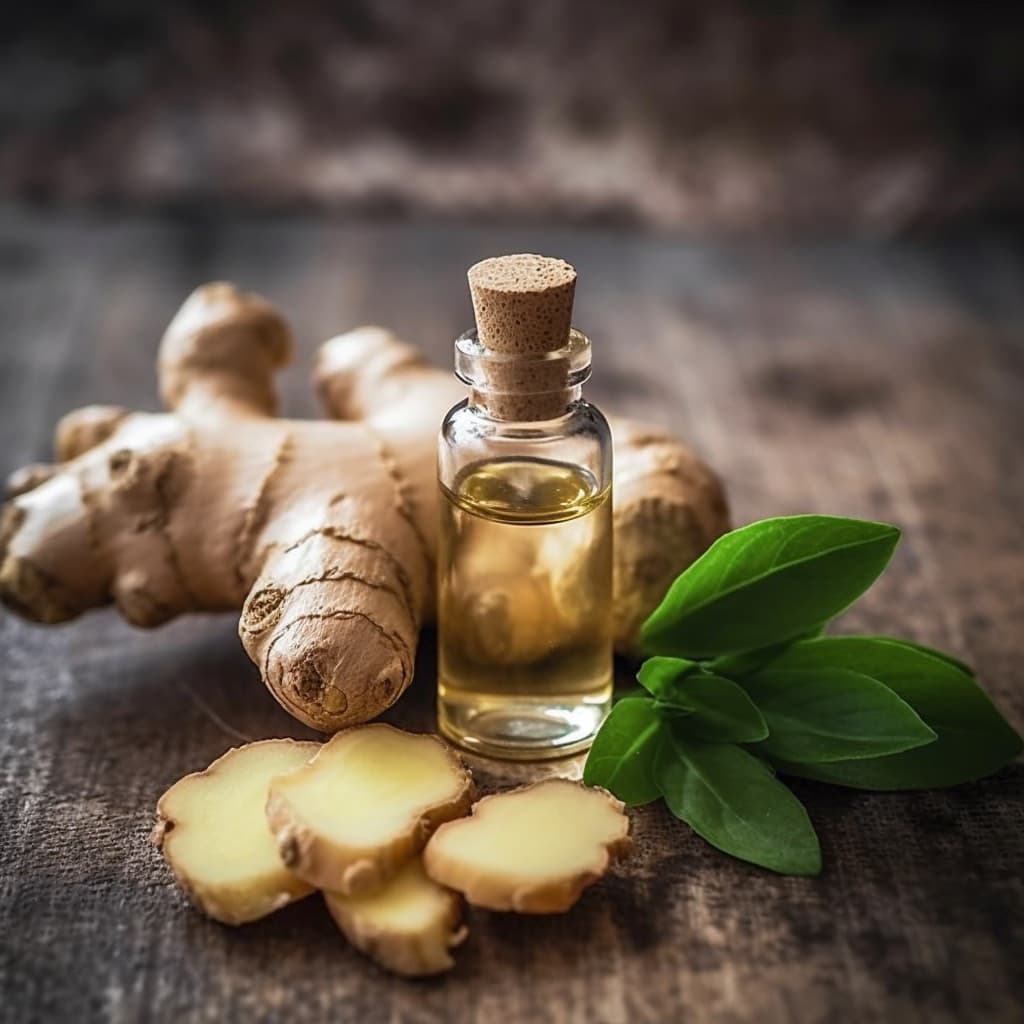Ginger

Ginger, also known as Zingiber officinale, is a popular spice in many cuisines around the world. Not only is it used for flavor, but it has also been used for its medicinal properties for centuries. One way to harness the power of ginger is through its essential oil. Ginger essential oil is derived from the rhizome, or underground stem, of the ginger plant. In this blog article, we will explore the benefits of ginger essential oil and how it can be used to alleviate various health conditions.
Properties and Composition
Ginger essential oil is extracted through steam distillation of the ginger rhizome. It has a warm, spicy, and slightly woody aroma. The oil is yellow in color and has a thin consistency. The primary components of ginger essential oil are gingerol, zingiberene, and beta-phellandrene. Gingerol is the most abundant component and is responsible for many of the oil's medicinal properties.
Health Benefits of Ginger Essential Oil
Indigestion
Ginger essential oil is known to be effective in alleviating digestive issues such as indigestion, nausea, and diarrhea. It works by increasing the production of digestive juices and enzymes, which help to break down food and improve digestion. The oil also has anti-inflammatory properties that can reduce inflammation in the digestive tract, which can contribute to indigestion.
To use ginger essential oil for digestive issues, mix a few drops of the oil with a carrier oil such as coconut oil and massage onto the stomach area. Alternatively, add a few drops to a warm bath or inhale the aroma through a diffuser.
Sore Throat and Cold
Ginger essential oil has antiviral and antibacterial properties that make it effective in treating sore throats and colds. It can help to reduce inflammation and congestion in the respiratory system, making it easier to breathe.
To use ginger essential oil for sore throats and colds, add a few drops to a bowl of hot water and inhale the steam. You can also add a few drops to a carrier oil and massage onto the chest and throat area.
Muscle Pain and Arthritis
Ginger essential oil has analgesic and anti-inflammatory properties that make it effective in treating muscle pain and arthritis. It can help to reduce inflammation and swelling, which can alleviate pain and stiffness in the joints.
To use ginger essential oil for muscle pain and arthritis, mix a few drops of the oil with a carrier oil and massage onto the affected area. Alternatively, add a few drops to a warm bath or inhale the aroma through a diffuser.
Nausea
Ginger essential oil is effective in alleviating nausea and vomiting, especially during pregnancy or after surgery. It works by reducing the activity of the digestive muscles, which can contribute to nausea.
To use ginger essential oil for nausea, inhale the aroma through a diffuser or add a few drops to a carrier oil and massage onto the stomach area.
Loss of Appetite
Ginger essential oil can help to stimulate the appetite and improve digestion, making it useful for those experiencing a loss of appetite. It works by increasing the production of digestive juices and enzymes, which can help to break down food and improve nutrient absorption.
To use ginger essential oil for loss of appetite, inhale the aroma through a diffuser or add a few drops to a carrier oil and massage onto the stomach area.
Runny Nose
Ginger essential oil can help to alleviate runny noses caused by allergies or colds. It has anti-inflammatory and antihistamine properties that can reduce inflammation and congestion in the respiratory system.
To use ginger essential oil for a runny nose, add a few drops to a carrier oil and massage onto the chest and throat area.
Precautions and Considerations
While ginger essential oil is generally safe for most people to use, there are some precautions to keep in mind. It should not be used by pregnant women or those with sensitive skin without first consulting a healthcare provider. The oil can also interact with certain medications, so it is important to speak with a healthcare provider before using ginger essential oil if you are taking any medications.
Additionally, it is important to dilute ginger essential oil with a carrier oil before applying it to the skin to avoid irritation or allergic reactions. Always perform a patch test on a small area of skin before using the oil more widely.